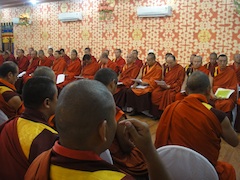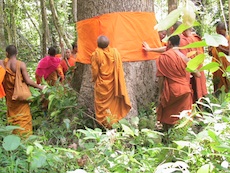The Buddhist Declaration on Nature - Assisi 1986
This is the Buddhist Declaration on Nature, taken from the original Assisi Declarations on Nature. These were created in 1986, at a meeting held in Assisi by WWF-International and stemming from an idea by HRH the Prince Philip, at which five leaders of the five major world religions – Buddhism, Christianity, Hinduism, Islam and Judaism – were invited to come and discuss how their faiths could help save the natural world.
Link here to read all five original Assisi declarations.
The Buddhist Declaration on Nature
By Venerable Lungrig Namgyal Rinpoche, Abbot of Gyuto Tantric University
Homage to Him whose vision and speech
Made Him unexcelled as a sage and a teacher;
The Being who saw the interdependence of Nature
And taught it to the world.
In the words of the Buddha Himself: "Because the cause was there the consequences followed; because the cause is there, the effects will follow". These few words present the interrelationship between cause (karma), and its effects. It goes a step further and shows that happiness and suffering do not simply come about by chance or irrelevant causes. There is a natural relationship between a cause and its resulting consequences in the physical world. In the life of the sentient beings too, including animals, there is a similar relationship of positive causes bringing about happiness and negative actions causing negative consequences.
Therefore, a human undertaking motivated by a healthy and positive attitude constitutes one of the most important causes of happiness, while undertakings generated through ignorance and negative attitude bring about suffering and misery. And this positive human attitude is, in the final analysis, rooted in genuine and unselfish compassion and loving kindness that seeks to bring about light and happiness for all sentient beings. Hence Buddhism is a religion of love, understanding and compassion and committed towards the ideal of non-violence. As such, it also attaches great importance to wildlife and the protection of the environment on which every being in this world depends for survival.
The simple underlying reason why beings other than humans need to be taken into account is that, like human beings, they too are sensitive to happiness and suffering; they too, just like the human species, primarily seek happiness and shun suffering. The fact that they may be incapable of communicating their feelings is no more an indication of apathy or insensibility to suffering or happiness than in the case of a person whose faculty of speech is impaired.
 |
 |
 |
Buddhists in Bhutan discuss how to improve the environment |
Yet it would appear from past history that the opposite view has been predominant.
Hence many have held up usefulness to human beings as the sole criterion for the evaluation of an animal's life. Upon closer examination one discovers that this mode of evaluation of another's life and right to existence has also been largely responsible for human indifference as well as cruelty to animals, not to speak of violence in today's world. On sober reflection, one can find that there is a striking similarity between exterminating the life of a wild animal for fun and terminating the life of an innocent fellow human being at the whim of a more capable and powerful person. We should therefore be wary of justifying the right of any species to survive solely on the basis of its usefulness to human beings.
Many additional factors contribute to and reinforce this insight in Buddhism. A philosophical system which propagates the theory of rebirth and life after death, it maintains that in the continuous birth and rebirth of sentient beings (not only on this planet but in the universe as a whole) each being is related to us ourselves, just as our parents are related to us in this life. And just as our own parents have been indispensable to our upbringing in our present lifespan, in another particular span of our life another particular sentient being has given us the spark of life. The fact that we are totally unaware of such a relationship does not undermine this observation any more than that a particular person is not someone's parent simply because they do not realize the connection.
 |
 |
 |
Cambodian Buddhists ordain trees as they ordain monks - in order to encourage people to protect them |
We are told that history is a record of human society in the past. From existing sources there is evidence to suggest that for all their limitations, people in the past were aware of this need for harmony between human beings and nature. They loved the environment. They revered it as the source of 7ife and wellbeing in the word. In my faraway country, I still remember what my parents said: they told us that various spirits and forces are dormant in the rivers, mountains, lakes and trees. Any harm done to them, they said, would result in drought, epidemics and sickness in human beings and the loss of the fertility of the earth.
We regard our survival as an undeniable right. As co-habitants of this planet, other species too have this right for survival. And since human beings as well as other non-human sentient beings depend upon the environment as the ultimate source of life and wellbeing, let us share the conviction that the conservation of the environment, the restoration of the imbalance caused by our negligence in the past, be implemented with courage and determination. These teachings lead us to the following words by His Holiness the Dalai Lama:
"As we all know, disregard for the natural inheritance of human beings has brought about the danger that now threatens the peace of the world as well as the chance to live of endangered species. Such destruction of the environment and the life depending upon it is a result of ignorance, greed and disregard for the richness of all living things. This disregard is gaining great influence. If peace does not become a reality in the world and if the destruction of the environment continues as it does today, there is no doubt that future generations will inherit a dead world.
"Our ancestors have left us a world rich in its natural resources and capable of fulfilling our needs. This is a fact. It was believed in the past that the natural resources of the Earth were unlimited, no matter how much they were exploited. But we know today that without understanding and care these resources are not inexhaustible. It is not difficult to understand and bear the exploitation done in the past out of ignorance, but now that we are aware of the dangerous factors, it is very important that we examine our responsibilities and our commitment to values, and think of the kind of world we are to bequeath to future generations.
"It is clear that this generation is at an important crossroad. On the one hand the international community is able now to communicate each other's views, on the other hand the common fact is that confrontation far outweighs constructive dialogue for peace.
Various crises face the international community. The mass starvation of human beings and the extinction of species may not have overshadowed the great achievements in science and technology, but they have assumed equal proportions. Side by side with the exploration of outer space, there is the continuing pollution of lakes, rivers and vast parts of the oceans, out of human ignorance and misunderstanding. There is a great danger that future generations will not know the natural habitat of animals; they may not know the forests and the animals which we of this generation know to be in danger of extinction. We are the generation with the awareness of a great danger. We are the ones with the responsibility and the ability to take steps of concrete action, before it is too late."
|

